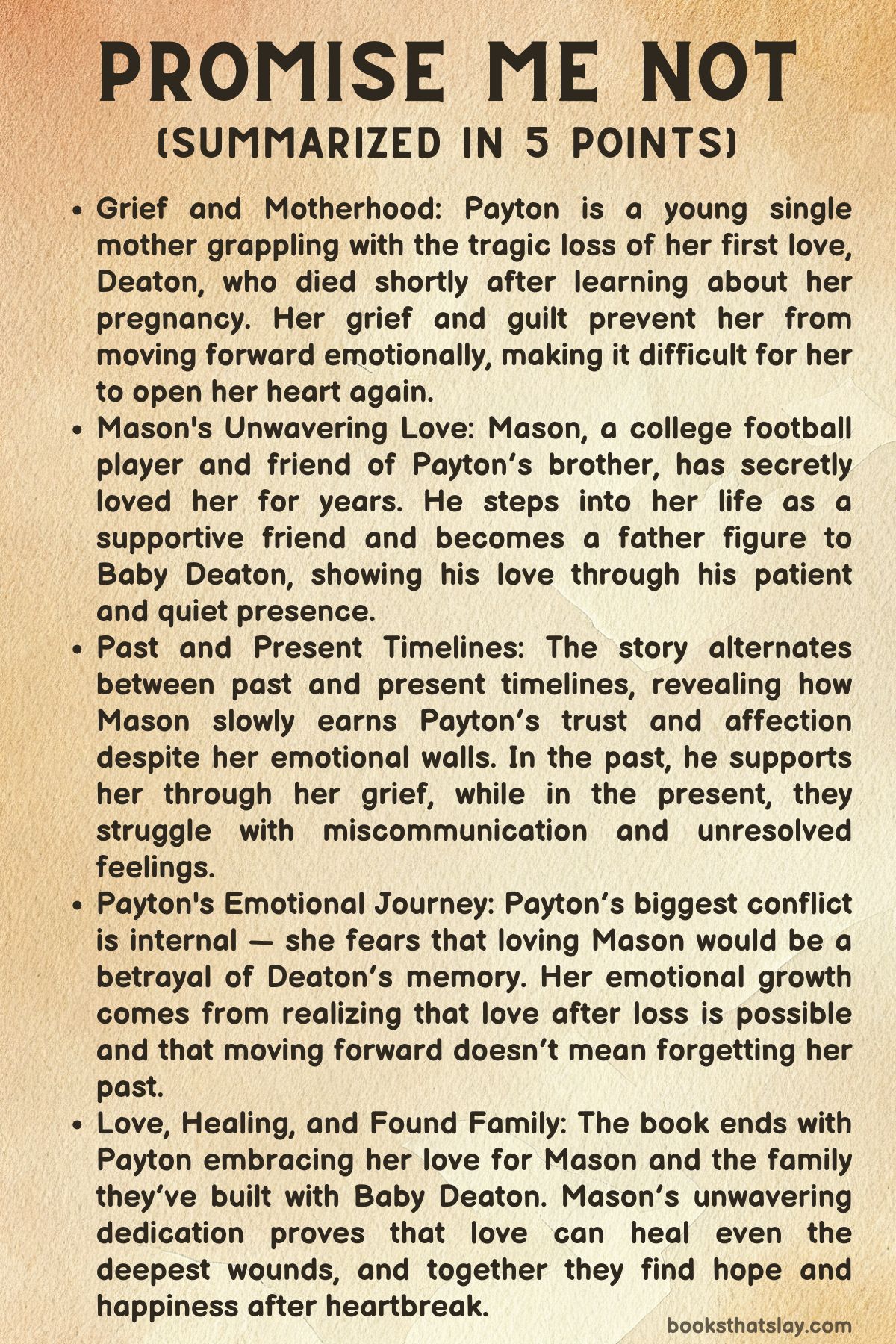Promise Me Not by Meagan Brandy Summary, Characters and Themes
Promise Me Not by Meagan Brandy is an emotional, slow-burn romance about grief, healing, and second chances.
It tells the story of Payton, a young mother grappling with the tragic loss of her first love, and Mason, a patient, loyal college football player who has been quietly in love with her for years. As Mason becomes a steady presence in Payton’s life, particularly in her son’s, he proves that love after loss is possible. Through alternating timelines and heartfelt moments, the book explores how two broken souls can create a new family and find hope in the face of heartbreak.
Summary
Payton’s life is shattered when her first love, Deaton, dies tragically, leaving her alone and pregnant with his child.
Overwhelmed by grief and guilt, Payton struggles to cope with the challenges of motherhood and the lingering pain of losing Deaton. She isolates herself emotionally, refusing to let anyone in, convinced that opening her heart again will only lead to more loss.
Her grief also strains her relationship with her toxic, unsupportive parents, leaving her feeling more alone than ever.
Enter Mason, a college football player with dreams of going pro. He has known Payton through his friendship with her brother, Chase, and has quietly loved her for a long time.
Despite his feelings, Mason keeps his distance out of respect for her loss. However, when he sees how much Payton is struggling, he decides to step in and support her — not out of obligation, but out of genuine love for both her and her son, Baby Deaton (Little D).
The narrative alternates between past and present timelines, slowly revealing how Payton and Mason’s relationship develops over time. In the past timeline, Mason becomes a quiet, steady presence in Payton’s life.
He supports her as a friend, attending doctor’s appointments, offering emotional support, and even being there for the birth of Baby D. Mason cuts the umbilical cord, symbolizing his deep connection to the child.
Despite his growing love for both Payton and Baby D, Mason doesn’t push Payton for more, respecting her need to heal at her own pace.
In the present timeline, Payton is emotionally distant from Mason, terrified of the possibility of losing him the way she lost Deaton. She repeatedly pushes him away, convinced that moving on would be a betrayal of her first love’s memory. Mason, however, refuses to give up.
He patiently waits, quietly showing his love through acts of service, especially by being a father figure to Baby D. His dedication never wavers, even when Payton’s fear of losing him causes her to make heartbreaking decisions.
A major turning point occurs when Mason helps Payton find Deaton’s grave, giving her the closure she needs.
This act of love shows Payton that Mason isn’t competing with Deaton’s memory; he’s simply offering her a new beginning. This moment forces Payton to confront her unresolved grief and guilt.
Complicating matters is Chase, a recurring character from the first book. His presence causes tension between Payton and Mason, especially when Payton leans on him for emotional support.
However, Chase eventually plays a pivotal role in helping Payton realize that her love for Mason doesn’t diminish what she shared with Deaton — it simply expands her capacity for love.
In the climax, Mason tells Payton he’s tired of waiting for her to let him in, but he still won’t give up on her. His heartfelt declaration finally breaks down Payton’s emotional walls.
She realizes that Mason is her second chance at happiness and that she deserves love after loss.
The story ends on a hopeful note, with Payton fully embracing her love for Mason and their little family with Baby D. Together, they move forward, healing from the past and building a future filled with love and possibility.

Characters
Payton
Payton is a complex and deeply emotional character whose journey is marked by grief, loss, and the struggle to heal. The loss of her first love, Deaton, who is also the father of her child, Baby D, casts a long shadow over her life.
Her internal conflict revolves around her guilt for moving on from Deaton, whom she believes she still owes her heart and soul. She is a teenage mother, and her devotion to Baby D is unwavering, which both grounds her and complicates her ability to move forward.
Payton’s emotions are often a barrier to her relationship with Mason, as she fears that loving him would be a betrayal to Deaton’s memory. Throughout the story, Payton wrestles with her desire for love and the guilt that holds her back.
Her journey is one of self-discovery, ultimately learning that opening her heart to Mason doesn’t erase Deaton but allows her to embrace a new future.
Mason
Mason is introduced as a college football player with big dreams, but his heart belongs to Payton long before he admits it. His love for her is patient, selfless, and persistent, even in the face of her constant rejection.
Mason is aware of Payton’s grief and the obstacles it presents, yet he steps into her life with quiet determination. He plays the role of a protector, friend, and father figure to Baby D, embracing both mother and child as his own.
His acts of service define his love language; he doesn’t need grand gestures to prove his commitment. Mason’s relationship with Payton evolves slowly, and his unwavering devotion to her ultimately proves that love can heal deep wounds.
His dedication to her and his role in Baby D’s life showcases his emotional maturity and his willingness to sacrifice for the sake of their happiness. Mason is the anchor in Payton’s stormy world, providing stability and a constant source of support.
Baby Deaton (Baby D)
Baby D is not just a child in the story but a living embodiment of Payton’s past and the potential for her future. He represents both the pain of loss, as the son of Deaton, and the hope for renewal, as a link to a new life with Mason.
Baby D is an essential part of Payton’s journey, serving as a reminder of her first love but also of the family she could build with Mason. Despite the overwhelming grief surrounding his conception and the circumstances of his father’s death, Baby D is the catalyst for Payton’s emotional healing.
His presence in Payton’s life brings moments of joy, tenderness, and responsibility that force her to reframe her understanding of love and attachment. He is the focal point around which Payton’s growth and healing revolve.
Deaton
Deaton, though deceased, plays an essential role throughout the story. His memory is the central source of Payton’s grief and emotional turmoil.
He is the father of Baby D, and the love Payton shared with him defines her early adulthood. His death, which occurred shortly after she discovered she was pregnant, leaves Payton with deep guilt and unresolved emotions.
Deaton’s absence creates a complex layer of conflict in Payton’s relationship with Mason, as she fears that moving on would mean forgetting him. However, through the course of the narrative, Payton comes to realize that her love for Deaton doesn’t prevent her from loving again, but rather, it informs her understanding of what it means to love fully.
Chase
Chase is a recurring character who adds complexity to Payton and Mason’s relationship. He serves as a source of emotional support for Payton, and his presence creates a sense of tension, especially between Mason and Payton.
Although Chase does not have a romantic relationship with Payton, his closeness to her often causes Mason to question their bond. Chase’s role in the story primarily centers around his ability to help Mason and Payton confront their feelings for one another.
By encouraging Payton to open up and embrace her love for Mason, Chase helps facilitate the emotional breakthrough that leads to their reconciliation. His character adds some external conflict, highlighting the emotional stakes between the main couple.
Alistair
Alistair’s subplot, while adding some narrative depth, feels disconnected from the central themes of the story. He is a teammate of Mason’s and has unresolved issues with him, stemming from a past relationship and a false pregnancy claim that jeopardized Mason’s football career.
Alistair’s resentment and the drama surrounding his subplot create some moments of tension but do not substantially impact the main love story between Payton and Mason. His role, although adding complexity to Mason’s life, doesn’t have the same emotional weight as the other characters and serves more to enrich Mason’s personal journey rather than influence the central narrative.
Themes
Grief, Loss, and the Complex Journey of Healing from the Trauma of Losing a Loved One
The central theme of Promise Me Not revolves around the profound emotional journey that Payton undergoes after losing her first love, Deaton, and the subsequent trauma of being left alone to raise their son. Her grief is not just an immediate response to the death but a lingering presence that impacts every aspect of her life.
The story deeply explores how this grief shapes her relationships, particularly her inability to fully let go of the past or embrace a new future with Mason. Payton’s emotional wall, constructed out of guilt and the fear of betraying Deaton’s memory, keeps her from opening her heart to Mason, despite his unwavering support.
This struggle between holding onto the past and moving forward is a recurring challenge in the book, making grief not only a process of mourning but an active emotional battle. The complexity of this theme is woven throughout Payton’s internal conflict, showing the depth of the loss and the daunting road to healing that she faces.
The Emotional Weight of Parenthood and How it Shapes Personal Identity and Relationships
Another significant theme in the novel is the weight of parenthood, particularly young motherhood, and how it shapes Payton’s identity and the dynamics in her relationships. As a teenage mother, Payton’s entire existence is entangled with the responsibility of caring for her son, Baby D, and this role comes with its own set of emotional burdens.
The story emphasizes the emotional toll of single parenthood, especially for someone still processing intense grief, and how Payton’s commitment to her child both grounds and isolates her. Her fierce devotion to Baby D represents a sense of love that transcends the emotional turmoil she feels for herself.
In contrast, Mason steps in not only as a potential romantic partner but also as a father figure to Baby D, showcasing the unspoken bond between him and the child. Mason’s journey in accepting this new role further deepens the narrative, underscoring how love and commitment to a child can create a family dynamic that transcends traditional relationships.
The Struggles of Moving on from the Ghost of the Past While Trying to Build a Future
Payton’s internal conflict is heavily marked by her inability to move on from Deaton, who continues to haunt her thoughts and emotions long after his death. This theme is intricately woven into her relationship with Mason, as Payton constantly grapples with the guilt of feeling as though she is betraying Deaton’s memory by even considering a future with someone else.
The deep connection she once had with Deaton creates a ghost-like presence in her life, preventing her from being fully present in her relationship with Mason. This struggle between holding onto the past and forging a future with Mason represents the emotional toll of unresolved grief and how it distorts one’s perception of self-worth and the ability to love again.
The idea that moving on doesn’t mean forgetting is a powerful theme throughout the book, and it manifests in Payton’s gradual realization that loving Mason doesn’t erase Deaton, but instead opens her heart to the possibility of new love without losing the old.
Unwavering Patience and Sacrificial Love as Cornerstones of a Relationship Built on Mutual Understanding
The theme of sacrifice and unwavering love is deeply embodied by Mason, who continuously supports Payton and Baby D despite the emotional and physical distance that Payton creates. Mason’s love is portrayed not just as romantic but as an act of selflessness, where he repeatedly sacrifices his own desires and dreams for the sake of supporting Payton through her grief and emotional healing.
This theme becomes even more evident in Mason’s quiet acts of service, whether it’s attending the birth of Baby D or helping Payton process her grief by searching for Deaton’s grave. His dedication to Payton and Baby D represents a love that isn’t about personal gain but is founded on a deep, unconditional commitment to the people he loves.
Mason’s journey is one of patience, as he waits for Payton to be ready to let him in, despite the emotional walls she’s built around herself. His persistence and sacrifice form the bedrock of their eventual relationship, underscoring the idea that love, in its truest form, requires time, patience, and the willingness to put the needs of others first.
The Complexities of Found Family and the Power of Building Emotional Bonds Beyond Bloodlines
Found family plays a crucial role in Promise Me Not, especially in how Mason, Payton, and Baby D form an unconventional family unit despite the lack of support from Payton’s biological family. Payton’s parents are unsupportive, and this creates an emotional void that makes Payton’s bond with Mason even more significant.
As Payton struggles with loneliness and the burdens of motherhood, Mason becomes more than just a love interest; he becomes her anchor. His relationship with Baby D further cements the idea that family is not solely defined by blood, but by the strength of the emotional connections we choose to form.
This theme highlights the resilience of human relationships and the power of unconditional love in creating a sense of belonging and home. It’s through Mason’s involvement with Baby D that Payton begins to heal and accept the possibility of building a new family, one that doesn’t replace the old but instead enriches it.
The Difficulties of Communication and Misunderstanding in Relationships and the Toll It Takes on Emotional Growth
Miscommunication and the emotional fallout from unspoken feelings are central to the tension in Promise Me Not. Much of the conflict between Payton and Mason arises from their inability to effectively communicate their fears and desires.
Payton’s emotional distance, largely due to her unresolved grief and the fear of moving on, leads to many misunderstandings that complicate their developing relationship. Mason, despite his steadfast love, often struggles with how to break through Payton’s walls, leading to moments of tension and frustration.
The novel underscores how emotional growth and healing require open dialogue and vulnerability. Payton’s internal battles prevent her from articulating her feelings, and this lack of communication results in both hurt and frustration for both characters.
Ultimately, it is only when Payton allows herself to confront her emotions and communicate openly with Mason that they are able to resolve the misunderstandings and build a future together.
The Healing Power of Love After Loss and the Courage to Embrace Vulnerability Again
At its core, Promise Me Not is about the transformative power of love after experiencing deep loss. The story is a testament to how love, though complicated and often painful, can also be the healing balm that restores emotional equilibrium.
For Payton, love is not something she can immediately embrace due to her fear of loss, but as the narrative unfolds, she begins to understand that love is not about erasing the past, but about allowing herself the chance to experience joy and fulfillment again.
This theme of learning to be vulnerable after loss is a significant emotional turning point in the story. Mason’s love, unwavering and selfless, becomes the catalyst for Payton’s eventual healing, allowing her to confront her grief and embrace a future filled with the possibility of new love.
The story’s message is one of hope — that even after the most devastating losses, the capacity to love and heal remains within reach, provided one is willing to take the risk.


